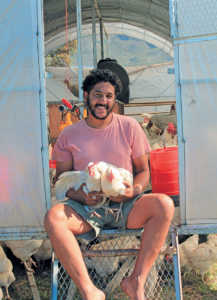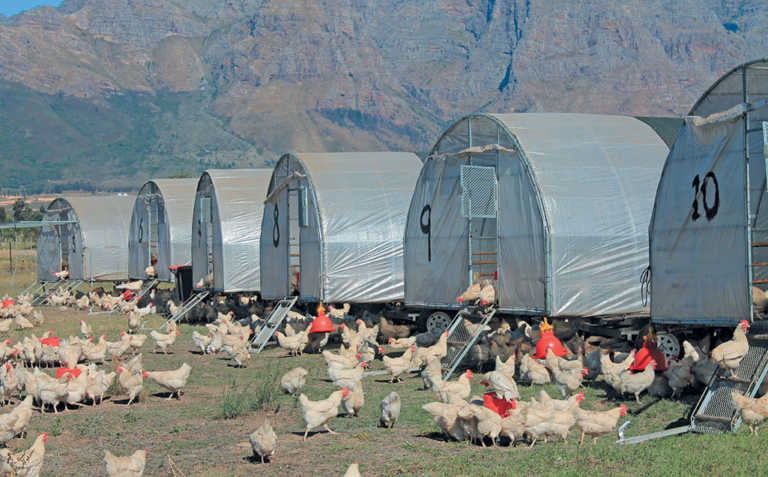Rico Vergotine of Idas Valley in Stellenbosch was an electric gate technician, “who happened to be at the right place at the right time”. In 2010, he was repairing gates at the Spier wine estate in Stellenbosch when he met Angus McIntosh, who runs the Spier Biodynamic Farm.
“At that stage, I was bored with my job and needed a new challenge,” recalls Vergotine.
“Angus and I started chatting and I asked if he had a job for me on the farm.”
READ 10 ways to make sure your poultry stay healthy
McIntosh had nothing to offer him at the time, but noted Vergotine’s enthusiasm. When the position for a maintenance technician became available at Spier, McIntosh prompted him to apply, and he was subsequently employed.
The farm was well run, however, and there was little to repair. So Vergotine soon found himself helping out with the sheep, cattle and chickens, and went on to spend the next four years working alongside McIntosh.
“I learnt a lot about biodynamic agriculture, cattle, sheep and chicken farming, running a small abattoir and butchery, and processes such as packaging, retail, labelling and creating new products,” says Vergotine.
“I also learnt about regenerative farming practices, a way of farming that aims to increase and sustain productivity by restoring and enhancing the environment.”
In 2014, Rob Lundie, then co-owner of Boschendal, approached Vergotine with an offer to start a pasture-raised chicken production business using mobile trailers.

Although he had gained some experience in this regard, Vergotine did not immediately accept the offer.
“I was very happy at Spier and didn’t want to leave,” he recalls. “Fortunately, this didn’t discourage Rob, and a year later he made me an offer I couldn’t resist.”
New venture
Vergotine started his business with five trailers and 250 Amberlink White and Lohmann Brown chickens he had bought with seed funding provided by the Boschendal Wine Estate/Beyond Us Trust. He is 51% co-owner of the operation.
In 2016, he was ready to expand, but securing finance for an early-stage start-up proved difficult. He finally received funding from the Western Cape Department of Agriculture, which enabled him to buy an additional five trailers and a small tractor to pull them from one location to another.
Currently, his 2 500 Amberlink White layers are housed in 10 chicken trailers, each 8m x 4m in size. Vergotine and his team of four workers move the trailers between 30m and 40m to a fresh patch of grazing daily.
The chickens can forage freely across the pasture throughout the day.
“The chickens enhance soil fertility by working their manure into the soil, and they help manage crop pests by grazing on various weeds and insects,” explains Vergotine.
The birds can be rotated into pasture following other livestock, such as cattle. “By scratching through cow patties, they spread the manure, which helps fertilise the grass grazed by the cattle.”
Egg production
Point-of-lay pullets are sourced from local suppliers at the age of 19 weeks and introduced to the egg production cycle.
During the day, the layers return to their trailers to lay their eggs, which are collected twice a day. Vergotine’s production rate (the average productivity of all hens over their lifetimes) is normally 85%, but due to his aging flock it has dropped to 75%.
READ Free-range eggs add value for commercial producer
Birds are usually kept up to 64 weeks before being culled and sold to the informal market, or to retailers who want cull birds. However, in the wake of the recent avian flu outbreak, Vergotine now keeps his layers a few months longer.
“There’s currently a scarcity of layers, so I try to keep my current flock in production as long as possible,” he says.
Each trailer is equipped with a solar panel to provide light, especially during winter.
“The decreasing daylight in winter causes egg production to dwindle. Therefore we
manipulate the light in the trailers,” says Vergotine.
He insists on giving his chickens as comfortable a life as possible and therefore treats them
with the utmost care and respect. He is extremely particular about feed, and provides his layers with ad lib access to non- GMO feed made by Profile Feeds.
Consumption averages 145g of feed per chicken per day. Every third month Vergotine
vaccinates his chickens against Newcastle disease and infectious bronchitis. To date, his flock has not experienced any problems with disease. He believes that, being outdoors, the birds develop a healthy immune system, “as well as eating healthy feed”.
He stresses the role played by clean water in layer health.
“We clean our water tanks every second week. If your water is clean and fresh, you go a
long way towards keeping your chickens healthy and strong.”
Market access
“There’s always a demand for pasture-raised eggs,” he adds. “Supply always struggles to keep up.”
Boschendal takes 40% of his eggs for its restaurant and deli. Vergotine also sells his free-range eggs to a number of KwikSpar outlets in Stellenbosch, various organic shops, and selected restaurants and delis in the area.
The eggs are graded and packed on Boschendal with an egg grader that Vergotine
bought with grant money from the Western Cape Department of Agriculture. Eggs are marketed as large 6s and 18s, and retail at R21 to R23 per half-dozen.
Vergotine hopes to increase his flock to 4 500 by the end of the year, but acknowledges
this will be a challenge due to the scarcity of layer hens.
Theft is an ongoing problem.
“Last year, I lost about 1 500 layers between June and October,” he says. “What made this even worse was that I couldn’t easily replace the chickens due to the scarcity of layers
brought on by bird flu.”
Vergotine is nonetheless keen to keep scaling up efficiently without cutting corners.
“The well-being of the land, animals and community in which the business operates are
of the highest importance,” he says. “My ultimate aim is to heal the land and improve the lives of employees and customers through the empowerment of future project owners.”
Such projects, adds Vergotine, have “the potential to ripple beyond the original business
into the community at large”.
Email Rico Vergotine at ricovergotine@hotmail.com.



